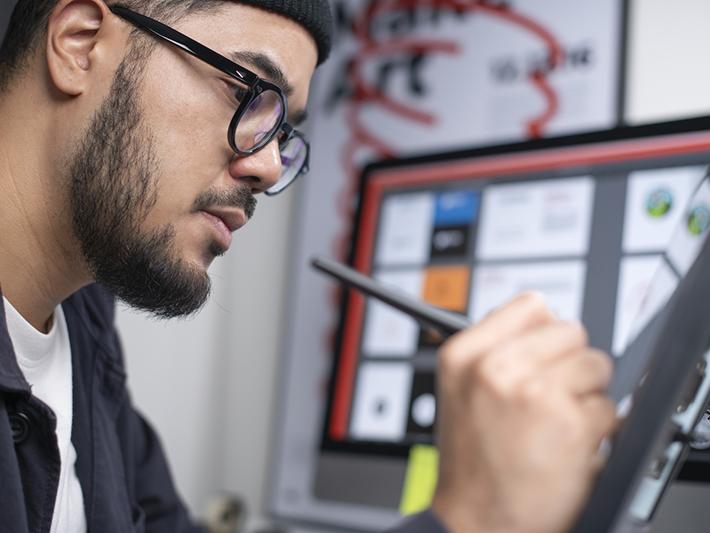
Fostering a start-up culture among academic staff

You may also like
For an arts university, developing entrepreneurial opportunities among academic staff presents unusual challenges, including how to foster a start-up culture across the full diversity of disciplines and practices, and how to engage staff, many of whom work part-time or have their own private professional venture.
At the University of the Arts London (UAL), we are investing in the pipeline of entrepreneurial opportunities from our academic staff and collaborating with the ARC Accelerator to help bring those opportunities to market. We are supporting the full diversity of commercialisation routes, from sale to licences to start-ups, while retaining a primary focus on social enterprise.
At UAL, we can also draw on our strong record for nurturing student entrepreneurship. In 2022, a higher percentage of our graduates founded businesses than those of any other UK university. These start-ups span artistic professional practices, social ventures and technology ventures; they reinforce our symbiotic relationship with the creative economy and have significant potential to scale up their positive impact on the world.
- Spotlight: what innovation needs to thrive in higher education
- THE podcast: an interview with UAL president James Purnell
- How to train entrepreneurs in five steps
These are the approaches that we are adopting to foster a start-up culture among our academic staff that you may also want to consider.
Embed entrepreneurship in your strategy and mission
A university’s strategy enables it to align its mission with long-term goals, ensuring that it remains relevant and impactful in addressing societal needs and fostering innovation. Entrepreneurs emerging from this environment will be key in driving forward innovative solutions, helping to shape industries and tackle the complex challenges of tomorrow’s world. At UAL, in line with our 2022-32 strategy, we have made sure that supporting entrepreneurial activities among academic staff and students is a central element in our journey “to change the world through creative endeavour”. Embedding entrepreneurship into our mission is just one of many ways we aim to demonstrate the immense value of creativity to society and the economy.
Enable strategic resource-sharing
Strategic resource-sharing within universities creates a more connected and supportive environment for both academic and entrepreneurial growth. At UAL, we are accelerating the entrepreneurial capacity of our six London colleges by articulating our diversity as a “creative enterprise network”. A community of practice meets regularly to promote the strategic sharing of resources, expertise and networks to scale up the impact of staff and student ventures. Identifying this network serves to reinforce our strategy and mission in this area.
This can also work between universities. Shared initiatives can bring a critical mass of specialist expertise for creating new ventures from smaller universities. For example, we have been awarded funding to pilot a shared technology transfer office with Lancaster University and four other institutions. The focus is creative and social ventures that grow organically from sales rather than raising venture capital. A key feature is a shared external business unit that allows emerging ventures to trade and test their markets without the immediate need to incorporate. This kind of collaboration demonstrates how resource-sharing can amplify impact not just within a single institution but across a network of universities.
Celebrate the diversity of commercialisation routes
Start-ups have become the dominant focus in many universities and in news flow, potentially creating a “hero founder” culture that could deter those would-be academic entrepreneurs for whom a lower barrier-to-entry route is appropriate. As an arts-focused institution with a mission in social purpose, the pipeline of opportunities from UAL’s academic staff is inherently diverse, with sale or licensing, rather than start-up, often being the preferred commercialisation route. We need role models across all these routes to inspire and engage the greatest number and diversity of academic staff.
Establish an enabling intellectual property policy and founder-friendly spin-out terms
Consider introducing a flexible intellectual property (IP) policy that allows for different models for how revenue is shared. This approach can motivate both full- and part-time staff to pursue entrepreneurial ventures. UAL’s IP policy offers two revenue-sharing models: one where UAL leads commercialisation and receives the larger revenue share, and another where academic staff lead and retain the larger share.
Complementing our IP policy, we have also adopted the founder and investor-friendly recommendations from the independent review of university spin-out companies. The review provides guidelines that include recommendations for the maximum amount of equity that should be taken by the university in various types of spin-out. These guidelines, which empower academic staff to commercialise their ideas, provide clear equity structures, benefiting both founders and investors while avoiding unnecessary negotiation.
As UAL’s student start-up pipeline demonstrates, ventures from UAL academic staff are likely to include IP-intensive spin-outs with design, engineering or life sciences technology. So it’s beneficial for us, and any other institution, to build an entrepreneurial culture for academic staff using these government-backed guidelines, which reflect the latest global university practices.
Explore new enterprise models: two case studies
Venture builders: creating companies from scratch with investors
We are experimenting with a “venture builder” model, where start-ups in the creative sector are created from the ground up in collaboration with investors. Unlike conventional university commercialisation models, which begin with the outputs of funded research, this model seeks to proactively identify areas of market need and build companies that address them. The team and the IP are assembled as the project develops, while guided and supported by an experienced and committed investor. This pilot plays a part in our social purpose mission as it aims to create global-impact, high-value, creativity-driven ventures.
Designer in residence: helping communities build their own ventures
The “designer in residence” model places designers or entrepreneurs within communities to help them develop self-sustaining businesses. For example, this approach has been used at UAL to empower refugees to create businesses using excess stock donated by industry, helping them to escape the cycle of dependency on aid. The designer facilitates connections across the value chain, bringing in technical and business training from the university. Once the business is established, the designer moves on to replicate the model elsewhere, acting as a serial catalyst for new ventures. UAL’s driver behind investing in this model is social purpose. No equity is taken by the designer or the university; the goal is purely to enable others with critical unmet needs.
A culture of entrepreneurship that includes academic staff
UAL is fostering a culture of entrepreneurship among academic staff through a combination of top-down and bottom-up strategies. We believe enhancing entrepreneurial activity among staff will, in turn, have a positive impact on the support they provide their own entrepreneurial students. More academic staff are acting as serial catalysts for student entrepreneurs, continuously brokering the university’s evolving knowledge base with the pipeline of talent. For us, the priority for university commercialisation and enterprise activities is not financial gain but rather creating an environment in which entrepreneurial academic staff can drive positive change.
Gavin Clark is the inaugural director of enterprise and commercialisation at the University of the Arts London.
If you would like advice and insight from academics and university staff delivered direct to your inbox each week, sign up for the Campus newsletter.


